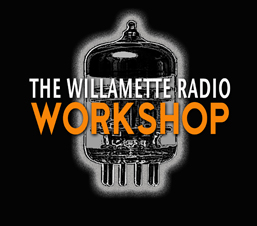OPB Radio’s news magazine airs Tuesday-Friday afternoons at 4:30
New “War of the Worlds” – Colin Fogarty
October 26, 2001
This weekend, a radio theater troupe in Portland will recreate a Halloween production from 1939. The “War of the Worlds” was Orson Welles’ early claim to fame. At a time, when the nation was preparing for world war, the “War of the Worlds” sounded real to many listeners. The modern production wouldn’t confuse anyone. But as Colin Fogarty reports, it could have some relevance for today’s audience.
You’ve heard Sam Mowry. But you likely didn’t notice him.
Commercial: The aggressive aerodynamic style of the Mitzubishi Eclipse will get you as much attention as you want. At a 16-valve engine and rack and pinion steering. And you my friend will be the total package. The GI Joe’s take it to the extreme 14-hour sale this Friday. We still have the sales. Grab the gear and seize the season.
Mowry’s got what in the business they call “great pipes.” But commercial voiceovers are his day job. He’s really a stage actor, playing every part from Henry the 8th to Henry Higgins. But Mowry’s latest project takes place in the theater of the mind. He plays Orson Welles in a radio theater production of the “War of the Worlds.”
Mowry voice: We know now that in the early years of the 20th century this world was being watched closely by intelligences greater than man’s, and yet as mortal as his own”.
Welles voice: We know that as human beings busied themselves about their various concerns they were scrutinized and studied, perhaps almost as narrowly as a man with a microscope might scrutinize the transient creatures that swarm and multiply in a drop of water.
Saturday night, Mowry?s Willamette Radio Workshop is staging a live performance of “War of the Worlds” in the worlds at the New Coho Theater in Northwest Portland. He hopes, in part, the revival will change people’s perception of Orson Welles.
Mowry: What they’re used to hearing from Orson Wells is the “Yes, we will sell no wine before it’s time.” And that’s what most people go, “Oh yeah, Orson Wells, the wine guy.” But when he was doing this, he was 21, 22, he’s actually much higher.
Mowry listened to old-time radio as a child, back when stations ran reruns of programs like “The Shadow.” As an actor in Portland, he found that there was a great deal of interest among fellow actors.
Mowry: What I love about it as an actor is that you can be anything you want to be. And my Dad, and I think everybody has this story, when my parents asked him whether he liked radio or TV better, he said, “Oh, I like radio, the pictures are much better.”
By re-producing the “War of the Worlds,” the Willamette Radio Workshop hopes to raise money for a series of original radio theater productions. At a time when foreign correspondents report by videophone and the Internet is more common than the newspaper, radio theater seems antiquated. But Mowry believes radio can forge a closer tie with the listener.
Mowry: And it is that intimate connection between a person and a microphone and that microphone and somebody’s ear, and you’re talking to them and you’re sharing an idea or love or hate or envy or any kind of human emotion that you’re sharing with them in a very intimate, very personal way makes for a tremendous connection.
Mowry says the production of “War of the Worlds” has special significance for our time. Just as in the radio play, the nation has been under attack’by hijackers using airplanes as weapons and by bioterrorists, sending anthrax spores through the mail. Some listeners of the original “War of the Worlds” panicked thinking Martians were really invading.
Mowry: And one of the things that we learned is that we do need to think before we act. And I think that’s as much of a good lesson today as it was back then. And even more so now because I think we’re a little more on par with the Martians ourselves in terms of having weapons of mass destruction that maybe we can and cannot use wisely.
Mowry hopes the re-production of the “War of the Worlds” doesn’t scare its audience during a delicate time. Rather the play is meant to comfort.
Mowry: It all comes out in the end. Humanity does survive and humanity does survive because there’s an innate plan for us to survive.
Welles voice: This is Orson Welles, ladies and gentlemen, to assure you that the “War of the Worlds” has no further significance than the holiday offering it was intended to be.
Mowry: So, good-bye everybody and remember the terrible lesson you learned tonight: that grinning, glowing, globular invader of your living room is an invader of the pumpkin patch. And if your doorbell rings and there’s nobody there, that was no Martian, it’s Halloween.
Copyright 2001Â Oregon Public Broadcasting, Inc. All Rights Reserved.
